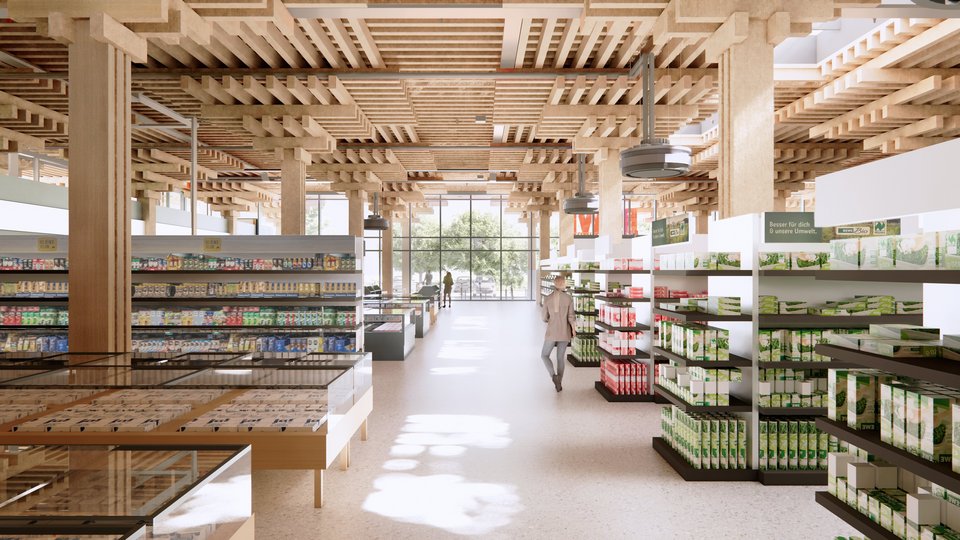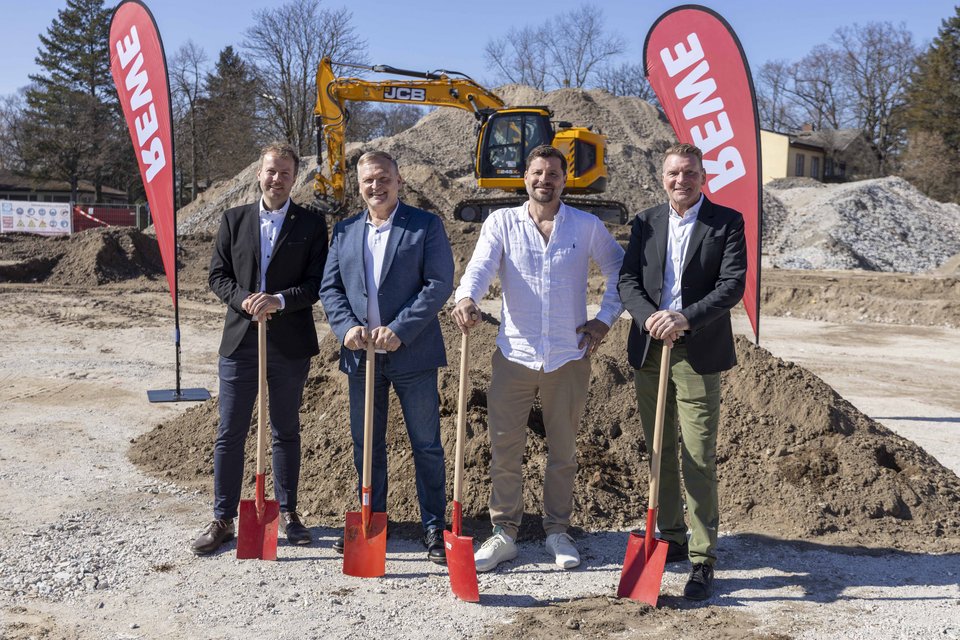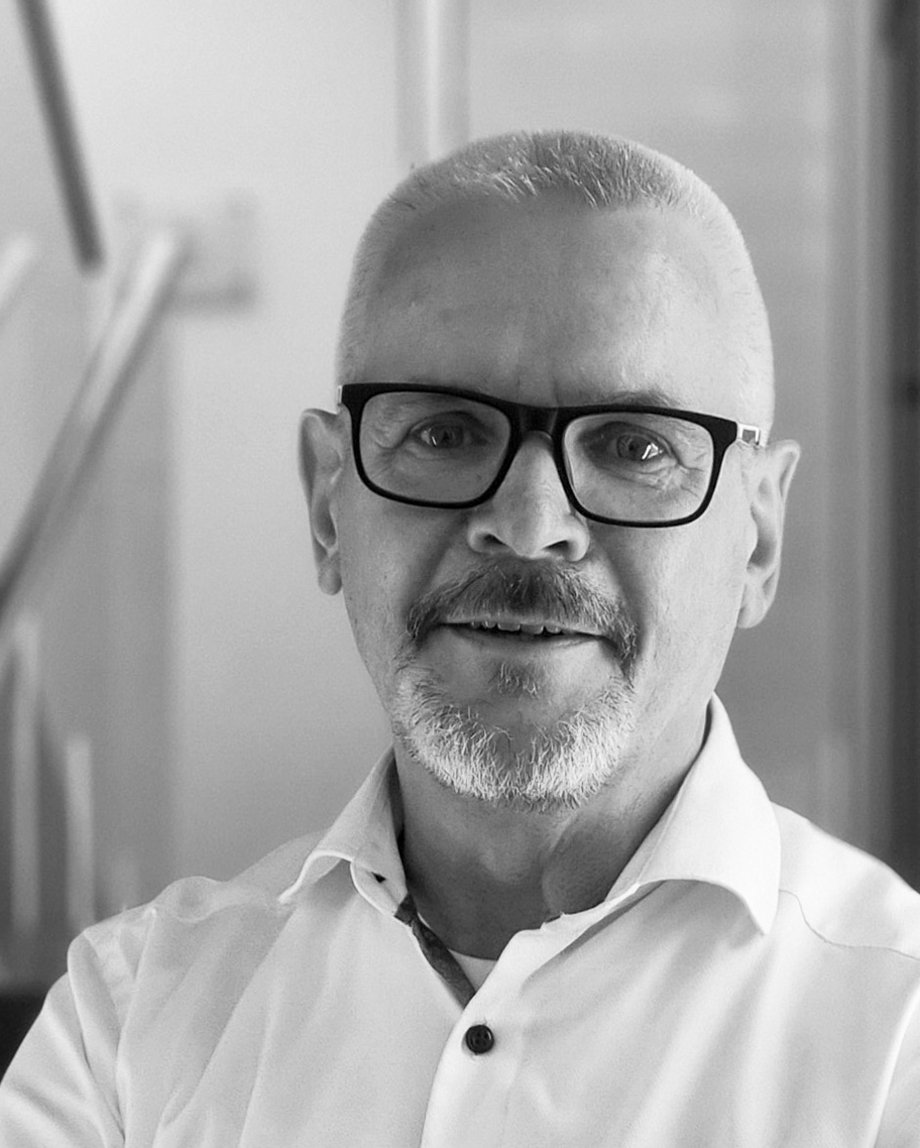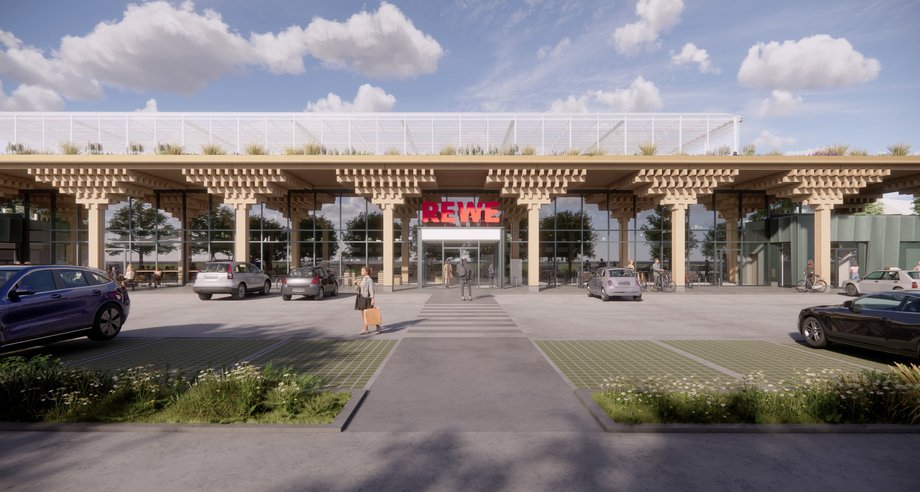
REWE is going into series production with its pioneering, recyclable supermarket concept. The second REWE Green Farming centre in Germany will be built in the south of Berlin by spring 2026. On 28 March, the REWE Region East celebrated the start of construction on the pioneering project. Klaus Wiens, Head of Store Construction at REWE, explains in an interview what lessons have been learnt from the pilot store in Wiesbaden-Erbenheim, why we are focusing on recyclable supermarkets and which green building projects are still in the pipeline.
The grocery shop with a glass roof farm is characterised by its modular timber construction with a supporting structure of solid columns. The Berlin-based company ECF Farmsystems will operate the capital's largest rooftop farm and grow lettuce above the imposing market hall made of wood and glass. REWE Group Management Board member Peter Maly is convinced by the natural construction method: "Wood is the core element of our supermarket of the future. We are binding many hundreds of tonnes of CO2. And we are closing the building cycle. This means that in a few decades we could dismantle the store and reuse the components." REWE Green Farming Berlin uses local softwoods, which store over 700 tonnes of carbon dioxide. In 30 years, the wood will have grown back and the carbon footprint will be balanced.
The Berlin-based company ECF Farmsystems stands for innovative food production in urban areas. With the development and future operation of the 2,760 square metre rooftop farm on the REWE store in Berlin, ECF is sending a strong signal for sustainable, regional production. REWE Green Farming will harvest over 900,000 fresh salad mixes all year round and supply up to 700 supermarkets in the capital region and beyond. "By utilising roof areas as well as sunlight, waste heat, rainwater and existing logistics routes, we are not only saving valuable resources - we are even avoiding CO2 emissions," explains Nicolas Leschke, Managing Director of ECF Farmsystems. "The special thing about a rooftop farm, however, is the climate-independent production and the outstanding product quality - made possible by daily harvesting at the optimum ripening time and extremely short distances to the markets."
Cultivation takes place in a hydroponic system - almost without soil and fully automated. All growing conditions are precisely tailored to the needs of the plants and are controlled electronically. ECF already produces basil exclusively for REWE Hauptstadt just seven kilometres away on the site of the Berlin Malzfabrik.

 Klaus Wiens, Head of Construction Store Construction REWE
one: Green farming goes into series production. After the first store opened in Wiesbaden almost three years ago, REWE is building the next recyclable supermarket with a rooftop farm in Berlin. Why was the location on Malteser Strasse in the south of the capital chosen?
Klaus Wiens, Head of Construction Store Construction REWE
one: Green farming goes into series production. After the first store opened in Wiesbaden almost three years ago, REWE is building the next recyclable supermarket with a rooftop farm in Berlin. Why was the location on Malteser Strasse in the south of the capital chosen?
Klaus Wiens: The conditions in Berlin were favourable for a quick start. The site, on which a supermarket had previously stood, is owned by REWE. In addition, there were no special planning requirements there. In addition to the site in Berlin, we already have other projects in the pipeline. But the lead times are longer there. But it's legal to say that the store on Malteser Strasse is the next generation of green buildings
one: The store in Wiesbaden was the pilot for a recyclable supermarket concept. What insights did you gain there that have now been incorporated into the series concept?
Klaus Wiens: The pilot store fully met our expectations. But of course everything is never perfect in a prototype. There are always lessons to be learnt. One of the most important insights we gained in Wiesbaden concerns the timber construction method. Today we can construct more simply, with fewer connecting elements. With this knowledge, we have developed different variants of the timber structure. As a result, we can now construct attractive and sustainable buildings at any location. With the store in Berlin, we are also building completely in wood for the first time - unlike in Wiesbaden, where the service areas are made of concrete. And there is something else we have further developed in terms of Sustainability: The heat supply for the rooftop farm and store is now provided entirely by heat pumps. A gas condensing boiler is used in the pilot store, where fish farming and plant cultivation are carried out on the rooftop farm.

one: Why is wood the first choice as a building material?
Klaus Wiens: Wood is the only building material that can have a positive ecological balance. It stores a lot of CO2, which improves the building's carbon footprint. In addition, all the timber used can be dismantled. They can be reused after dismantling and do not have to be recycled. From this perspective, the market in Berlin will not be an old building in perhaps 40 years, but a building materials depot. So we are building truly recyclable supermarkets.
one: Picking lettuce will be planted on the roof farm of the new Berlin market - using resources sparingly, in a hydroponic system without soil. What other roof uses are conceivable?
Klaus Wiens: In Berlin, lettuce was the best solution because our partner ECF Farmsystems already operates a farm in the capital that supplies fish and basil. A second aquaculture would not have made sense. Apart from urban farming, various roof uses are possible, for example as living or office space - possibly also in timber construction in the future. The shortage of living space and changing urban planning requirements make it necessary to think about the use of roofs. At REWE, we can offer corresponding sustainable and flexible concepts.
one: At what pace will the network of the new generation of green buildings be expanded?
Klaus Wiens: The first step is less about speed and more about learning and implementation quality. We must not forget that we are changing a lot with regard to the circularity of the markets. This applies to building materials, but also to construction methods. In future, we will build modularly, i.e. with a high degree of prefabrication. This enables very high quality and can shorten the project time by up to three months compared to conventional construction. All of our project partners, both planners and contractors, have to go along with this change.
one: If everything goes well..
Klaus Wiens:...we will set up one or two stores in each region over the next few years, gather experience, compare notes and then roll out the concept on a larger scale.
one: What are the biggest challenges here?
Klaus Wiens: As I said, the most important thing is to get everyone involved on board. Building Information Modelling, i.e. a working method in which planning and construction are based on a three-dimensional data model, has been on everyone's lips for years. But there are only comparatively few buildings that have been constructed using this method. At REWE, we don't want to wait for the market, we want to define the standards. We provide planning security and tell our partners: You can start with this system because we are creating the framework conditions for it. Nevertheless, it takes time for everyone involved to accept and implement it.
one: How is the search for suitable locations going?
Klaus Wiens : Finding attractive sites for the construction of new food retailers is always a challenge. But we have seen in the past that we can score points with our sustainable concept. If in future we can offer stores with a high level of design quality that can be recycled, this will make it easier to find sites. Modular construction gives us enormous flexibility, for example when it comes to façade or entrance design. It's a bit like Lego, where you can use the bricks to create a pony farm or a Star Wars Death Star. This allows us to construct a wide variety of building constellations.
one: Even though the new generation of green buildings is now going into series production, the learning process is not over. What happens next?
Klaus Wiens: We always try to look far into the future in order to gain insights into what needs to be done today in order to achieve our goal. This involves a lot of trial and error. It is also important to look less at others and more at what is best to do. REWE Group's strength lies not in building lighthouses, but in building pilots from which a high-performance series can be developed. The "old" green building concept is still a great approach to building sustainable stores today, with more than 400 realised projects. More than 70 per cent are rental properties. This shows that investors have quickly realised that sustainable building is not a luxury, but an economically attractive concept. In its own properties, REWE has been constructing sustainable buildings wherever possible for years.
